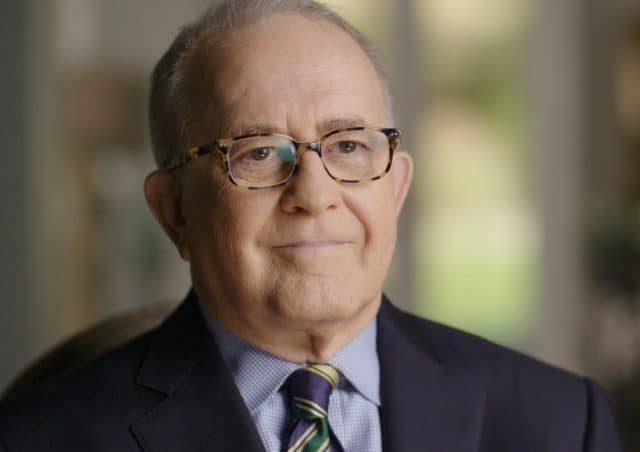
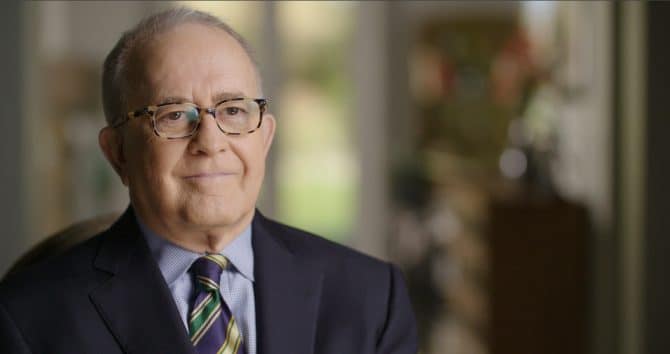 From 5B. Courtesy of Verizon Media
From 5B. Courtesy of Verizon Media
5B, the documentary from Acadamy Award nominee Dan Krauss and winner Paul Haggis, tells the story of the first AIDS ward. Located at San Francisco General Hospital, the story is told through the eyes of the medical professionals and volunteers who worked there.
As one of the first openly TV reporter in the Bay Area, Hank Plante reported almost daily on the AIDS crisis. Winner of six Emmy Awards, Plante has become a legend in his field partly by following his conscience: He felt a moral obligation to report on the epidemic ravaging his own community in the 1980s at a time when there was widespread ignorance about how HIV was spread and hatred aimed at the victims.
(Last year we reported on the importance of 5B before it had distribution. Acquired by Verizon Media, 5B hits cinemas this month.)
We caught up with Plante chat about his career, the movie and what it all means for the future.
I remember. It was actually a few blocks from here. I was living in West Hollywood in 1981. Yesterday, June 5, 1981, Dr. Michael Gottlieb, who still practices here, wrote about five gay men with unusual symptoms. Symptoms they should not have had. He published it in the CDC journal on June 5, 1981. I saw a guy I knew who was skin and bones. I remember it like it was yesterday. Then I saw more and more friends come down with the symptoms.
Oh no. We all thought—and by “we” I mean reporters and doctors—we all thought it would be like toxic shock syndrome. It came and went and they got that under control quickly. We had no idea that it would become a pandemic.
Oh yeah, I was out.
The blowback came later. In the beginning, the stories I was doing were—they were science stories. The blowback actually came in San Francisco of all places. I worked for a very good TV station with very good managers who let me do what I wanted and cover it the way I wanted to cover it. This was daily in the mid-80s. But there were people inside the station—and somebody actually said this out loud at the station—there were people who thought if we covered it too much it would hurt our ratings.
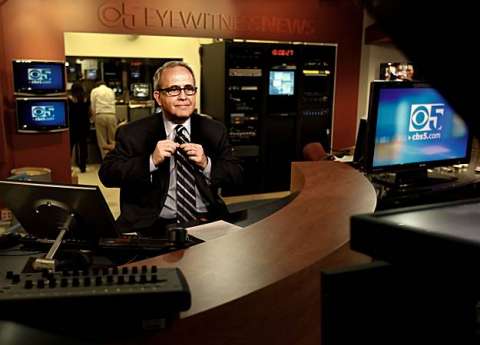 Courtesy San Francisco Chronicle
Courtesy San Francisco Chronicle
We actually had a guy who was in the PR department at the station said in a staff meeting “If you put gays on TV this much nobody is going to watch.” So there was that kind of blowback.
But having said that, it did not affect our coverage. Our bosses thought it was a compelling story and a public service. They let me cover it and do whatever I wanted. So is that blowback? I don’t know.
I did not. I wouldn’t have cared about it, to be honest with you. I mean, to me, I feel really fortunate to have covered it, weird as that sounds because it was a way for me to channel my grief and my anger into something. So it was more than just a story to me. We all felt really powerless. There were no drugs. I mean, there was AZT, but, you know…
And so it was just a chance for me to feel like I was doing something, which was night after night, telling people what’s the latest on the disease. How do you not get it? What drugs look promising? I felt like I was doing something. By the time I got to San Francisco, which was ground zero for the epidemic with more per capita cases than anywhere in the country. I got there in ‘85 and had honed my skills as a reporter enough, and was out enough so that I was just ready. I was ready.
I got a call out of the blue when they started doing their research, maybe two years ago. They said they were doing this film on 5B which I knew very well and said: “Will you be in it?” And I said, “I’d love to do it.”
Fortunately, I had kept a lot of my early AIDS stories. I had them transferred to DVD because tape, the medium of the time, disintegrates. And I had three discs at home because I knew at the time, it was something. I didn’t save every story. But there were significant stories that were important to me to have to show in my old folks home…
[Laughter]
…that I wanted to keep. So I was able to send them three discs that had a lot of my early stories on them. And you’ll appreciate this as a reporter: When you do a news story and you think it’s dead, you know, people read it and it goes away.
If it’s a really great story, they’ll praise you for a few months. I look back at my early work, and I’m really proud of it, but me and my husband are the only ones that remember it. So now to have the stories come back to life on the big screen, and to see it like this, or at Cannes, I’m so grateful. I thought it was gone.
Yes, I hope.
I had compartmentalized a lot of it, like a lot of gay men my age. It’s interesting, there are two groups of people who will react very differently to this film. One is people your age who did not live through it. Then there are the others my age who did live through it and put it out of our heads, otherwise, we’d just be crippled with PTSD. I started to get choked up a little bit when we were doing the interviews. So yeah, I had cut a lot of it out of my head.
I lost most of my friends, yeah.
Yeah.
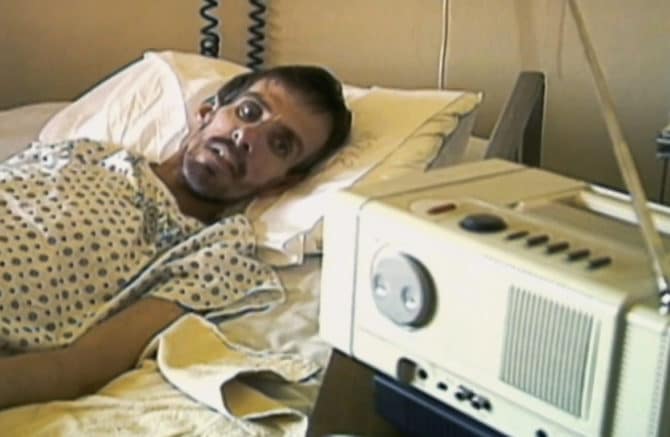 Patient in ward 5B
Patient in ward 5B
There’s no substitute for people who “knew you when.” I have a lot of friends now, but very few of them knew me way back when we were all coming out together and making our way in the world, at least my gay male friends. So it’s pretty sad.
Many times it was very upbeat, believe it or not, because the nurses were upbeat. You had people like Rita Rocket [a cabaret entertainer] coming in and cheering people up. It was not as funerial as you might expect. And the patients were getting very good care. It wasn’t like going into a hospice which is a whole different deal. I went to plenty of those as well. It was very reverential experience. And when I would go there, they were helping me with my stories.
I tried to say this in the film, but I don’t know that it came across. When you are working in daily news you get an assignment, kind of panic at the beginning of the day. You’ve gotta find people to interview. I gotta find someone with AIDS to interview, like now. I’m on the air at five, so like, now! And so I almost was unappreciative of what it was like to call these people and say, “Can you go on the air and talk about AIDS?” What I was really asking—Jesus Christ—was will you go on camera and talk about a deadly disease? And they would say yes, always, knowing that they don’t look well, or that they have lesions. Or that their co-workers or their family and their neighbors were going to see. Or that their landlords would see. And they would say yes because they wanted to help other people who were trying to deal with it. That’s why I say I was always appreciative when I would go into the ward or into apartments.
A little bit, and with Dannemeyer [anti-gay congressman William Dannemeyer, who later married Day]. A little bit. You know, the film is really good with her. This is the mark of a good editor because when you first see her, she makes sense.
She doesn’t want to get splashed by blood, is that so unreasonable? Then you peel the onion more, and more and more and by the end of the film you know she’s a wack job. [In addition to her antigay animus, Day has advocated “holistic” treatment through diet for cancer and denied the Holocaust ever happened.]
Yes, that’s exactly right. Then when you finally learn the connection to the husband, who was really antigay, and that’s always what it was about. It was never about AIDS.
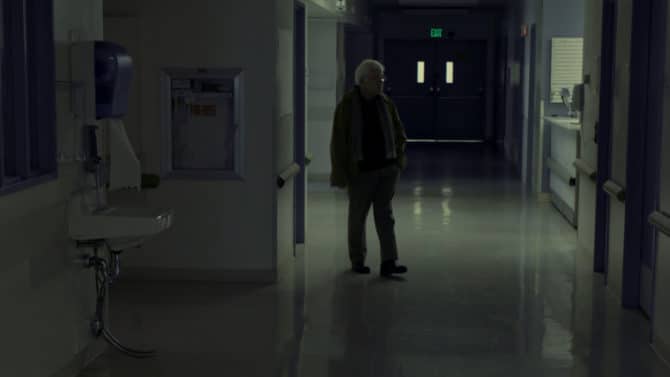 From 5B
From 5B
And there are a lot of people like that. She represents a lot of people. I talk in the film about the guy who died of AIDS at a company in San Francisco. They took his desk out to the parking lot and burned. It was bad. Lots of people got kicked out of their apartments before it was illegal to do that and fired. Fired from their jobs.
And that guy said to me, “Why didn’t they just ask if I could lip sync to Judy Garland?”
[Laughter]
Can you imagine sitting as a reporter and somebody says that?
I loved it. I loved every second of it. Chasing the lawyer down the hallway…I loved it.
I just take great joy in putting on camera and letting people see where we are. My job wasn’t to react to it, my job was to facilitate. I loved it so much. And the [man in question] won his case.
I feel like I made a difference. I don’t know how to answer that without sounding arrogant. I felt like I made a difference. I’m proud of the work that I did, and I did it for my friends who aren’t here. This was an opportunity. It was handed to me. I just happened to be a gay reporter in San Francisco. I don’t want to pretend to be altruistic. I wanted to work in that city. But yeah, I’m really proud of those years. It’s the best work I did in my life.
Yeah, it did then and it does now. Absolutely.
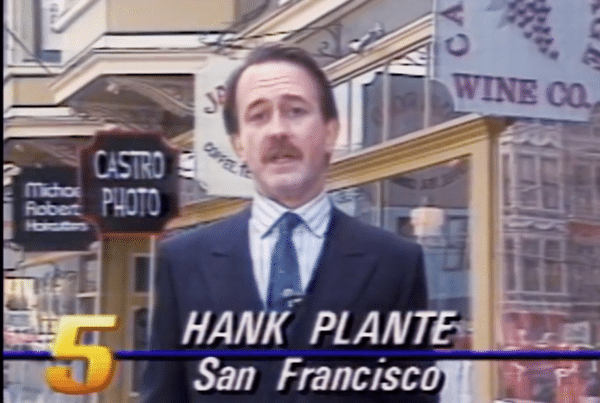 Courtesy KPIX-TV
Courtesy KPIX-TV
Wow.
[Long pause]
I learned I could do the job and put my emotions over here, and go on TV and report what was happening and not cry or say “f*ck you,” which was on my mind. I could cover people like Reagan, and interview his health secretary who was doing nothing at the time. I could really focus and use all that anger. Anger is a good motivator. I could use that anger to kind of let people at home know how absolutely terrible [the Reagan administration] was for their inaction. I liked confronting people on camera. I felt like I was standing up for my brothers and sisters. I really did.
But I couldn’t say that. I couldn’t go on TV and say “This is for you.” But that was in my heart, and I think they got it.
It’s the proudest work that I’ve done. And believe me, I’ve been blessed with a lot of stories. I’ve been to the Oval Office and on Presidential planes, but nothing tops [my AIDS reporting] because it was so personal for me, and because I think I made a difference. I honest to God believe we saved lives. Reagan was silent for six years. He didn’t say the word (AIDS) for six years.
And I was in the room when he said it for the first time in 1987, I made a note in my reporter’s book that 21,000 people had already died. Contrast that with what was going on in San Francisco for those six years, going on TV every night and saying “Don’t share needles. Don’t have sex without a condom. It’s spread by blood, not by mosquitos. Not by kissing.” Just telling people how to not get it—and by “we” I mean all of us—we saved lives.
This film is about the nurses. They’re the heroes. I hope people remember, they were doing this when people didn’t know how the disease was spread. They didn’t know if they were passing it to their kids, to their lovers. They just knew intuitively how to respond with skill, love, and compassion.
How many of us would have the guts to do that?
5B opens in theatres in June.







